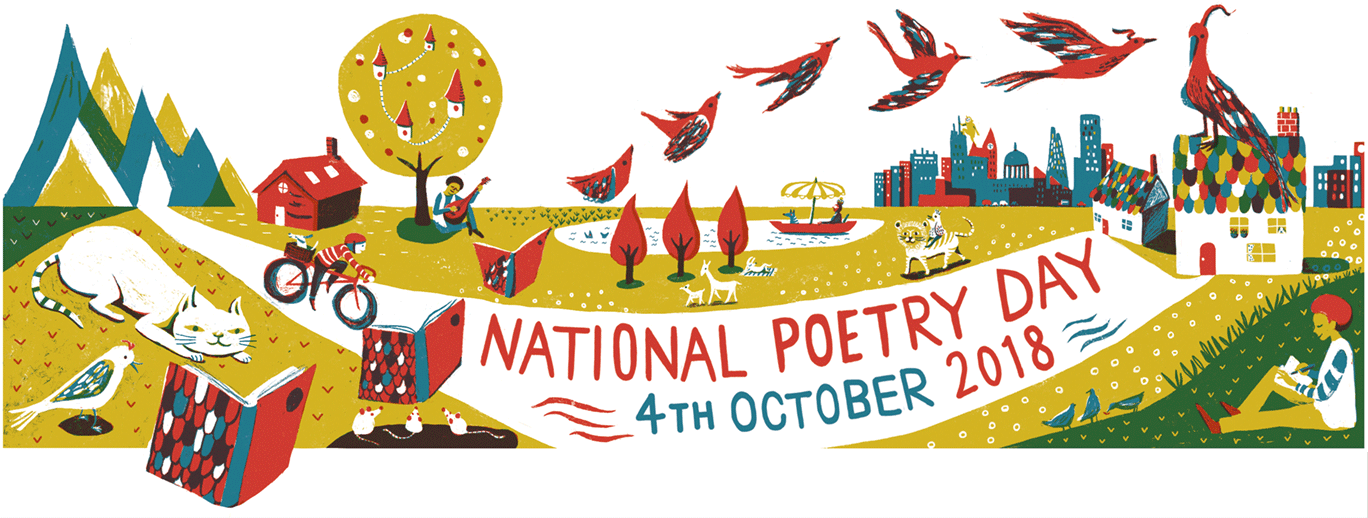Inspired by Chris Riddell, Carmen Walker-Vazquez celebrates last week’s National Poetry Day by sharing her favourite poems that focus on this year’s theme: change.
‘Change is the nursery
Of music, joy, life, and eternity.’ – John Donne Elegy III
With change comes growth, transformation and progress. Change can be frustrating, it can also be welcome. National Poetry Day 2018 celebrated this force of movement that is crucial to life, and essential for creating impacting works of poetry.
Poetry is never still. Rhyme and rhythm work as a backbone, creating a landscape of contradictions and texture. Even more significantly for the lyrical quality of spoken word, change within poetry constructs variety.
‘I saw the brown leaves dropping from their tree
In a still afternoon,
When no wind whirled them whistling to the sky,
But thickly, silently,
They fell, like snowflakes wiping out the noon’ – Margaret Postgate The Falling Leaves
Rhyme as the changing of the seasons, the instability of the elements. Change forms the richness of poetry. Without change, we would have no history, no movement forward.
In Kicking The Can, Freddie Robinson Jr. suggests the stagnation and entrenchment of ignorance and racism during the 1960s Civil Rights movement that came with the obstruction to change;
‘It makes you so mad, as you keep kicking the can
Kicking that can on down the road’
Life is not a monotonous road, and perhaps no form of literature portrays the ups-and-downs of life more vividly than the poem. For National Poetry Day, the acclaimed illustrator Chris Riddell compiled a list poems in the Guardian for key moments of his life, and in the spirit of participation as a poetry lover I’ve selected five poems that speak to my own experience of change.
- Full Fathom Five – William Shakespeare
‘Full fathom five thy father lies;
Of his bones are coral made;
Those are pearls that were his eyes:
Nothing of him that doth fade
But doth suffer a sea-change
Into something rich and strange.’
Taken from Act I, Scene II of Shakespeare’s play The Tempest, ‘Full Fathom Five’ was originally intended to be sung by the character Ariel, the mischievous spirit who narrates the family drama. Apart from reminding me of an uncomfortable primary school performance where I had to wear an ugly blue leotard to be part of the ‘sea’, this lyrical piece explores themes of natural change and overcoming grief.
- The King of Fire – Nick Flynn
‘My first night without you
my wings fold back in on themselves—
all those birds inside or
released by your hands’
I came across Nick Flynn on the New Yorker poetry podcast (which I’d highly recommend for anyone interested in discovering new poets and discussions around literary themes), and was moved by the sadness of a sudden in this poem. Nick Flynn’s use of enjambment, the technique where one sentence continues beyond the line without a pause, suggests a stream of consciousness. The contrasts between the human and the animal almost become fused in this relentless pace.
- The Night Dances – Sylvia Plath
‘Such pure leaps and spirals –
Surely they travel
The world forever, I shall not entirely
Sit emptied of beauties’
Sylvia Plath’s poetry collection Ariel is something I’ve always looked back to, and I always find something new each time. In ‘Night Dances’ Sylvia Plath explores movement, with the lines and stanzas alternating like a dancer.
- Alone In The Woods – Stevie Smith
‘Nature has taught her creatures to hate
Man that fusses and fumes
Unquiet man’
In this poem Stevie Smith paints Mother Nature as an angry force, an environmentally conscious lament that remains pertinent with concerns over global warming and deforestation.
- Haiku – Mayuzumi Madoka
‘a shooting star —
in love with someone, not knowing
where it will lead me.’
The haiku constructs a whole world in three lines, a huge challenge for any aspiring poet. Mayuzumi Madoka encapsulates the uncertainty of time and space, an awareness of self and of the wider world.
Carmen Walker-Vazquez
Image Courtesy of nationalpoetryday.co.uk

